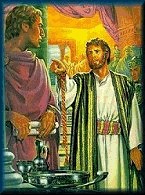 |
 |
|
Chapter 8 Mercy to the Persecuted But Judgment to the Persecutors "Paradise Restored To Mankind – By Theocracy!" pp. 130-3 18 "So the angel of Jehovah answered and said: 'O Jehovah of armies, how long will you yourself not show mercy to Jerusalem and to the cities of Judah, whom you have denounced these seventy years?'"—Zechariah 1:12. 19 To some minds, according to what was said by the angel, it appeared that Jehovah's denunciation of "these seventy years" was still continuing against Jerusalem and the other cities of Judah. This was due to the fact that the rebuilding of his temple had been neglected for the past seventeen years. He had had very much indignation against their fathers who suffered exile because of profaning the former temple that had been built by King Solomon. Now, in the eighth month (Heshvan) of the year 520 B.C.E. Jehovah had warned the repatriated Jewish remnant to avoid suffering divine indignation through becoming like their fathers and not returning to Jehovah with zeal for full worship of Him through a rebuilt temple. (Zechariah 1:1-6) In the light of this we are to understand the outcry of the angel according to what these things might indicate to him regarding Jerusalem and the other cities of repopulated Judah. 20 The angel's mention of these "seventy years" calls to mind the seventy years mentioned by the prophet Jeremiah. During those seventy years the nations of Judah and Israel must serve the dynasty of kings of Babylon, at the end of which seventy years Jehovah was to call the erroneous conduct of the king of Babylon and of the Chaldeans to account and He would punish them therefor. (Jeremiah 25:11-13) So did Jehovah's angel mean that those seventy years had not yet ended, or that they had just now ended? This could not historically be true. Why not? Because about twenty years before this (in 539 B.C.E.) Jehovah had used Cyrus the Great of Persia to overthrow Babylon as a world power and about two years later, in 537 B.C.E., Jehovah moved Cyrus who was acting as the king of Babylon to let the Jewish exiles leave Babylon and return to Jerusalem to rebuild Jehovah's temple.—Ezra 1:1 to 2:2; 2 Chronicles 36:20-23. 21 Furthermore, the land of Judah was to keep a "sabbath, to fulfill seventy years." (2 Chronicles 36:21) How? By lying as a "desolate waste without man and domestic animal," it having been "given into the hand of the Chaldeans." (Jeremiah 32:43; 33:10-12) Both the prophet Zechariah and the angels knew that those seventy years of utter desolation of the land of Judah and Jerusalem without man and domestic animal had ended in the year 537 B.C.E. when the Jewish remnant returned from Babylon and reoccupied the land, they being reported back in their cities in the seventh month (Tishri) of that year. (Ezra 3:1, 2) Instead of its lying as a desolate waste any longer, crops began to be raised in the land, as the prophet Haggai reports seventeen years later. (Haggai 1:6-11; 2:16, 17) So those seventy years were long past! 22 If, at the time of Zechariah's first vision, those seventy years were still continuing or were just now over, why would the angel, knowing what he did, speak as he did? Since he knew that the time period was definitely seventy years long, why would he say: "O Jehovah of armies, how long?" (Zechariah 1:12) Why, away back in the first year of Darius the Mede after the overthrow of Babylon in 539 B.C.E., the prophet Daniel "discerned by the books the number of the years concerning which the word of Jehovah had occurred to Jeremiah the prophet, for fulfilling the devastations of Jerusalem, namely, seventy years." (Daniel 9:1, 2) And certainly Daniel verified the number of years, not seventeen long years before they were due to end, but immediately before the end of the seventy years in the first year of the reign of King Cyrus the Persian. Thus the aged prophet Daniel, who lived at least into "the third year of Cyrus the king of Persia," could know that he had calculated the length of the time period correctly. (Daniel 10:1) Hence those "seventy years" did not extend to the time when Zechariah got his first vision, in 519 B.C.E. 23 Be it remembered, also, that those unforgettable seventy years were the first seventy years of the Gentile Times, "the appointed times of the nations." So, when those seventy years ended in 537 B.C.E., the Gentile Times still continued on for Jerusalem to be trampled on by the Gentile nations. (Luke 21:24) Apparently, then, the angel who cried out, "O Jehovah of armies, how long?" was referring back to that former period of seventy years as an illustration of Jehovah's denunciation of his chosen people. He was asking whether Jehovah's denunciation of them was being renewed because of their long neglect toward His temple. And so the angel was asking how long it would yet be before Jehovah would show mercy to Jerusalem and the other cities of Judah. The prophet Zechariah was also interested in knowing this. We, also!
|
| Home
| Contents Last revised: 97/11/09. Copyright © 1997 by Jehovah's Witnesses—Setting the Record Straight. All rights reserved. This web site is not affiliated with or sanctioned by the Watchtower Bible and Tract Society. However, every effort has been made to adhere to the current views published by the "faithful and discreet slave" (Matthew 24:45; Luke 12:42) through the Watchtower Bible and Tract Society. The "Official Web Site of Jehovah's Witnesses" can be found at http://www.jw.org, and should be recognized as the authoritative source about the beliefs, teachings, and activities of Jehovah's Witnesses. |